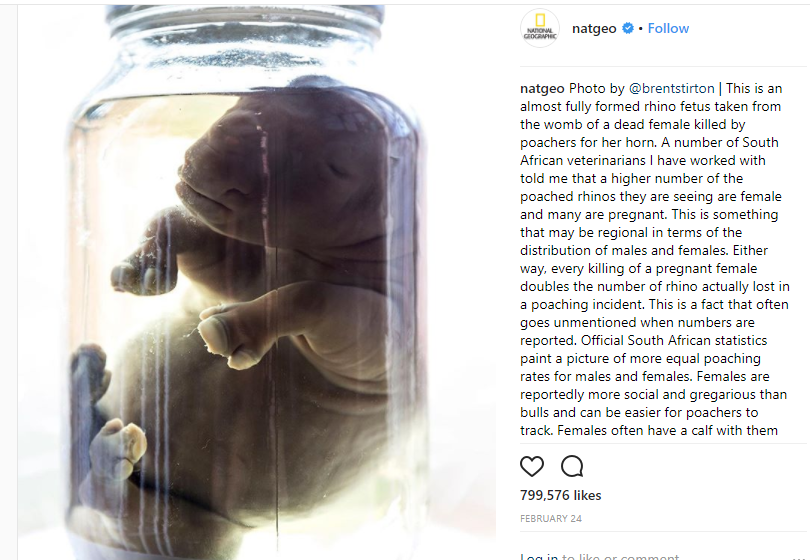Recently on Instagram, National Geographic shared a simple, powerful photo by Brett Stirton: a rhino fetus, preserved in a jar. The caption read: “This is an almost fully formed rhino fetus taken from the womb of a dead female killed by poachers for her horn. A number of South African veterinarians I have worked with told me that a higher number of the poached rhinos they are seeing are female and many are pregnant. This is something that may be regional in terms of the distribution of males and females. Either way, every killing of a pregnant female doubles the number of rhino actually lost in a poaching incident. This is a fact that often goes unmentioned when numbers are reported. Official South African statistics paint a picture of more equal poaching rates for males and females. Females are reportedly more social and gregarious than bulls and can be easier for poachers to track. Females often have a calf with them and they will stay to defend the calf rather than run away, that often makes them an easier target for poachers.”

The comment section was full of weeping emojis, angry red faces, and hate for poachers. Words like “heartbreaking”, “unbelievable”, and “disturbing” are repeated over and over. And it’s true: this little rhino was a victim of poaching no less than her mother. But why should it bother us so much when we allow the same thing to happen to human fetuses killed when their mother is victimized?
We observed something similar just a few short years ago right here in Canada. As the result of a selfish act, Cassie Kaake was murdered, along with her 7-month old pre-born child. There was national outrage that someone could commit such a heinous crime, and genuine shock that our laws did not recognize Cassie’s child (who she had already named Molly) as a victim alongside her mother. When MP Cathay Wagantall had an opportunity, she put forward legislation that addressed this void in Canadian law. Her bill recognized Cassie’s choice, and honoured it by recognizing Molly as a victim too. Ms. Wagantall, and the family of Cassie Kaake, worked hard to ensure that the outrage manifested was translated into meaningful action.
Unfortunately, many lawmakers are only about words, not meaningful action to effect change. Cassie and Molly’s law, as Ms. Wagantall’s private member’s bill was called, was voted down in Parliament.
Just as this baby rhino does not count in poaching statistics, so Molly did not count in the murder charges laid against the perpetrator in her mother’s death.
When we see this rhino, perfectly formed, no one hesitates for a moment to call it a rhino, a baby, and a victim. Where is the disconnect of political correctness that makes this ok for a rhino, but not for one of our own kind? Why can we not recognize the humanity of the pre-born child, and value it accordingly?
I was not the only one to feel the painful irony here. Commenter @rhettmoffett stated, “Imagine how sad it would be if it was a human baby rather than a wild animal.” Another, @bmoneyjo16, said, “Interesting because you’ll say a baby rhino was lost but won’t consider a baby in the womb to be human. Double standard.”
Commenter @whycantibejohnyoung gets more direct: “Maybe if half of you people actually saw a human fetus in a jar after an abortion you might think twice about shedding your fake emoji tears on this post. There are no words that can describe the magnitude of the moral hypocrisy I’m seeing here. I challenge Nat Geo to put equal spotlight on human fetuses, and I challenge each one of you to observe.”
Among multiple pleas to be kind to animals and the planet, one commenter added, “We are their only voice.”
We are called to be a voice for the voiceless, defenders of those weaker than ourselves. One commenter writes, “I think this is the saddest photo I’ve ever seen. Maybe spread this across the world.” As @lishlange states, “It’s all wrong – human babies & animals being poached.”
Every day, babies’ lives are terminated in the wombs of their mothers, often for the same reason as this rhino: simple human self-interest. National Geographic knows the power of pictures, and they do an incredible job advocating for so many of the earth’s voiceless inhabitants. It is our job to continue to do the same for our pre-born neighbours. When people think of abortion, may their first responses also be weeping, anger, and a righteous demand for change.